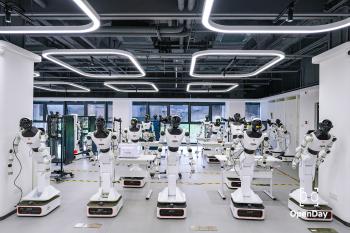High-precision quantum gates with diamond spin qubits
15.05.2025 - Very low error probabilities satisfy an important condition for future large-scale quantum computation.
Quantum computers are anticipated to be able to solve important problems that are beyond the capabilities of classical computers. Quantum computations are performed through a large sequence of basic operations, the quantum gates. For a quantum computer to function, it is essential that all quantum gates are highly precise. The probability of an error during the gates must be below a threshold, typically of the order 0.1 to 1 %. Only then, errors are rare enough for error correction methods to work successfully and ensure reliable computation with noisy components. Now, researchers at QuTech, in collaboration with Fujitsu and Element Six, have demonstrated a complete set of quantum gates with error probabilities below 0.1 %.
Spins in diamond are a type of qubit that shows promise for quantum computation. These qubits consist of electron and nuclear spins associated with atomic defects, for example a nitrogen atom replacing a carbon atom in the diamond. They operate at relatively high temperatures up to 10 Kelvin and are well protected from noise. Also, their natural connection to photons enables distributed computation over quantum networks. However, realizing a complete set of quantum gates with low enough error rates has remained a challenge until now. The researchers have now demonstrated a highly precise universal set of quantum gates using a diamond quantum chip. The researchers used a system of two qubits, one formed by the electron spin of the defect center, the other by its nuclear spin. Each type of gate in this two-qubit system operates at an error below 0.1 %, and the best gates even reach errors as low as 0.001 %.
“To realize such highly precise gates we had to systematically remove sources of errors. The first step was to use ultrapure diamonds that have a lower concentration of carbon-13 isotopes as these cause noise”, says Hans Bartling. The second key step was to design gates that carefully decouple the spin qubits from each other and from interactions with the remaining noise in the environment. A final challenge was to find tools to reliably characterize the gates and optimize their parameters. For this, the team turned to gate set tomography, which provides the full quantum description of the gates. “It was essential that our characterization provided complete and precise information about the gate errors, as this enabled us to systematically find imperfections and optimize all the gate parameters”, says Jiwon Yun.
Ultimately, the researchers put the quantum gates and their characterization to the test by performing an artificial algorithm with a large sequence of gates. After 800 gate operations the result could be accurately predicted from the team’s knowledge of the individual gates, indicating that the gate operations were now both precise and well understood. While high-precision universal gates are a key prerequisite towards quantum computation, there is still a long way to go to large scale computation. “Our demonstration was on a two-qubit system and using a particular type of defect”, says Tim Taminiau who supervised the research. “A key challenge is to maintain and further improve the gate quality when moving to chip-scale integrated optics and electronics and scaling to many more qubits.”
Realizing such larger processors is the focus of the research effort at QuTech and of its collaboration with Fujitsu. The team takes a full stack approach, in which not only improved quantum bits are studied, but also the required control electronics, scalable fabrication methods and new types of quantum computer architectures. “Making the next big step will require bringing together scientists, engineers and industry”, says Taminiau. (Source: QuTech)
Link: QuTech, Delft University of Technology, Delft, Netherlands







